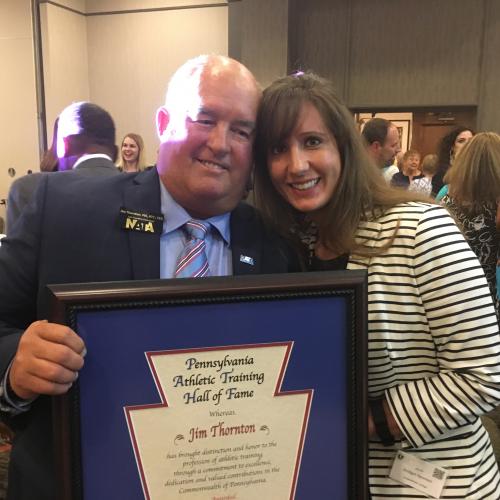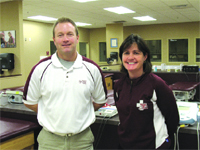
Article reposted from Springfield College
Author: Springfield College
How has having a Springfield College degree impacted you professionally?
In my opinion, a Springfield College degree in athletic training puts you at the forefront as a healthcare professional in the health care field. It prepares you holistically to treat patients, find the root cause, and practice evidence-based medicine. It teaches you to treat the patient as a person and not just by his/her injury or illness. A Springfield College degree teaches you to provide quality health care to the physically active population.
Each professor in the athletic training education program is extremely knowledgeable and skilled in the field of athletic training. Being taught by educators who were also your preceptors during clinical rotations, allowed you to carry over classroom knowledge to practical application. I am extremely blessed to have had the opportunity to be taught by the professors at Springfield College. They cared just as much about you as a person as they did you succeeding as a student and a future healthcare professional.
Who influenced you when you were a student at Springfield College and explain the role they played in your life?
Charles J. Redmond was one of the first professors who taught me at Springfield College. He is an incredible mentor, role model, healthcare professional, professor, and friend. Anytime I needed professional or personal guidance, he always made time for me. I am truly blessed to have had the opportunity to learn from him.
Susan Guyer was and still is one of the most instrumental athletic trainers that shaped my life at Springfield College and beyond. She is an incredible mentor, person, athletic trainer, and professor.
Mary Barnum was my advisor, program director, professor, clinical preceptor, and mentor while at Springfield College. She continues to provide advice and mentorship since graduating and I am lucky to have been able to learn from her. Learning from her as a preceptor and in the classroom, has really taught me to not forget steps and think outside the box when evaluating patients.
Thomas Dodge was my senior clinical preceptor and professor. He has extreme passion and excitement for athletic training. His energy was and still is contagious. I am lucky to still have him as a mentor and call him a friend.
Barclay is an incredible role model and mentor to me on how to be a head athletic trainer. There are times I still reach to him for advice.
Wayne Rodrigues probably does not know this but I feel lucky and blessed to have had him as my emergency response lab instructor my first year. His experience, knowledge, excitement, and skills in emergency response, helped me save the life of a patient. His ability to make emergency simulations realistic in a lab setting gave me the confidence I have today when faced with emergency situations. He made me want to become a professor and teach emergency response to athletic training students. I hope someday to be able to do just this!
Vincent Paolone was my exercise physiology professor while attending Springfield College. His passion for Exercise Physiology really assisted me in understanding other facets of my education. I really enjoyed his teaching methods and learning from the chalkboard. The lab reports were quite long.
I took Daniel Zukergood’s Foundation of Multicultural Education class my senior year. I really learned a lot from him and I have taken many things from his class into my life outside of Springfield College.
I worked for Tamie Kidess Lucey and alumni relations while at Springfield College. It was my favorite job on campus because I learned how much the school really cared about the students and past/current/future alumni.
James Thorton, Michael Goldenberg, Jeff Stone, Jennifer Rath Semle, Charlie Thompson, AJ Duffy, Paul Ullucci, Tim Weston, Diane Sartanowicz, David Csillan, Robert Ward, John Furtado, Gregory Janik, Mary Mundrane-Zweiacher: These are all athletic trainers that I met while being on the EATA Student Delegation Committee and serving as Committee President. To this day, all of these individuals are mentors, friends, and athletic trainers I look up too. They all continue to serve our profession.
If you could share one piece of advice with today’s current Springfield College student, what would it be?
One piece of advice is hard so here are a few small ones: Experience every aspect of Springfield College. Take time to learn from your professors outside of the classroom. Ask as many questions as you can. Get involved in clubs, school activities, or in your professional field as a student. Take an internship and experience the world before graduating. Take chances and really grow as a person. Springfield College is an incredible college and there are so many incredible people who work there. Take this opportunity and really experience Springfield College.
Who do you want to thank personally for the role they have played in your success?
My parents Clede and Shelley Spooner: Without their support, I would not be where I am today.
Michael Pitts, who was the first athletic trainer I ever met and was the one who inspired me to become an athletic trainer.
The athletic training professors at Springfield College, who shaped me as the athletic trainer I am today.
All My Mentors: Every trial, challenge, and success I have had as an athletic trainer is all attributed to all the support, advice, education, and mentorship I have had from all the athletic trainers I have mentioned above.


